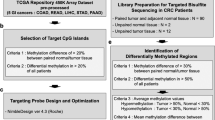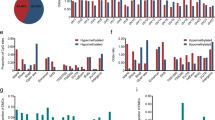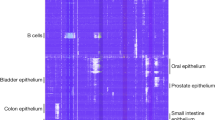Abstract
Epigenetic alterations, such as abnormal DNA-methylation patterns, are associated with many human tumour types. New techniques have been developed to perform genome-wide screening for alterations in DNA-methylation patterns, not only to identify tumour-suppressor genes, but also to find patterns that can be used in diagnosis and prognosis. However, interpretation of differential methylation has proven difficult because the significance of methylation alterations depends on the genomic region, and functions of CpG islands at specific sites have not been fully clarified. What techniques can be used to identify new tumour suppressors and diagnostic markers?
This is a preview of subscription content, access via your institution
Access options
Subscribe to this journal
Receive 12 print issues and online access
$209.00 per year
only $17.42 per issue
Buy this article
- Purchase on Springer Link
- Instant access to full article PDF
Prices may be subject to local taxes which are calculated during checkout



Similar content being viewed by others
References
Jones, P. A. & Baylin, S. B. The fundamental role of epigenetic events in cancer. Nature Rev. Genet. 3, 415–428 (2002).
Ohlsson, R., Renkawitz, R. & Lobanenkov, V. CTCF is a uniquely versatile transcription regulator linked to epigenetics and disease. Trends Genet. 17, 520–527 (2001).
Hark, A. T. et al. CTCF mediates methylation-sensitive enhancer-blocking activity at the H19/Igf2 locus. Nature 405, 486–489 (2000).
Bell, A. C. & Felsenfeld, G. Methylation of a CTCF-dependent boundary controls imprinted expression of the Igf2 gene. Nature 405, 482–485 (2000).
Jaenisch, R. & Bird, A. Epigenetic regulation of gene expression: how the genome integrates intrinsic and environmental signals. Nature Genet. 33 (Suppl.), 245–254 (2003).
Egger, G., Liang, G., Aparicio, A. & Jones, P. A. Epigenetics in human disease and prospects for epigenetic therapy. Nature 429, 457–463 (2004).
Takai, D. & Jones, P. A. Comprehensive analysis of CpG islands in human chromosomes 21 and 22. Proc. Natl Acad. Sci. USA 99, 3740–3745 (2002).
De Smet, C., Lurquin, C., Lethe, B., Martelange, V. & Boon, T. DNA methylation is the primary silencing mechanism for a set of germ line- and tumor-specific genes with a CpG-rich promoter. Mol. Cell. Biol. 19, 7327–7335 (1999).
Futscher, B. W. et al. Role for DNA methylation in the control of cell type specific maspin expression. Nature Genet. 31, 175–179 (2002).
Bird, A. DNA methylation patterns and epigenetic memory. Genes Dev. 16, 6–21 (2002).
Feinberg, A. P. & Vogelstein, B. Hypomethylation distinguishes genes of some human cancers from their normal counterparts. Nature 301, 89–92 (1983).
Kaneda, A. et al. Frequent hypomethylation in multiple promoter CpG islands is associated with global hypomethylation, but not with frequent promoter hypermethylation. Cancer Sci. 95, 58–64 (2004).
Chen, R. Z., Pettersson, U., Beard, C., Jackson-Grusby, L. & Jaenisch, R. DNA hypomethylation leads to elevated mutation rates. Nature 395, 89–93 (1998).
Gaudet, F. et al. Induction of tumors in mice by genomic hypomethylation. Science 300, 489–492 (2003).
Kanai, Y. et al. Aberrant DNA methylation on chromosome 16 is an early event in hepatocarcinogenesis. Jpn J. Cancer Res. 87, 1210–1217 (1996).
Yoshikawa, H. et al. SOCS-1, a negative regulator of the JAK/STAT pathway, is silenced by methylation in human hepatocellular carcinoma and shows growth-suppression activity. Nature Genet. 28, 29–35 (2001).
Suzuki, H. et al. Epigenetic inactivation of SFRP genes allows constitutive WNT signaling in colorectal cancer. Nature Genet. 36, 417–422 (2004).
Kaneda, A. et al. Lysyl oxidase is a tumor suppressor gene inactivated by methylation and loss of heterozygosity in human gastric cancers. Cancer Res. 64, 6410–6415 (2004).
Esteller, M. et al. Detection of aberrant promoter hypermethylation of tumor suppressor genes in serum DNA from non-small cell lung cancer patients. Cancer Res. 59, 67–70 (1999).
Wong, I. H. et al. Detection of aberrant p16 methylation in the plasma and serum of liver cancer patients. Cancer Res. 59, 71–73 (1999).
Laird, P. W. The power and the promise of DNA methylation markers. Nature Rev. Cancer 3, 253–266 (2003).
Belinsky, S. A. Gene-promoter hypermethylation as a biomarker in lung cancer. Nature Rev. Cancer 4, 707–717 (2004).
Ohgane, J., Hattori, N., Oda, M., Tanaka, S. & Shiota, K. Differentiation of trophoblast lineage is associated with DNA methylation and demethylation. Biochem. Biophys Res. Commun. 290, 701–706 (2002).
Kaneda, A., Kaminishi, M., Yanagihara, K., Sugimura, T. & Ushijima, T. Identification of silencing of nine genes in human gastric cancers. Cancer Res. 62, 6645–6650 (2002).
Hayatsu, H., Wataya, Y., Kai, K. & Iida, S. Reaction of sodium bisulfite with uracil, cytosine, and their derivatives. Biochemistry 9, 2858–2865 (1970).
Hatada, I., Hayashizaki, Y., Hirotsune, S., Komatsubara, H. & Mukai, T. A genomic scanning method for higher organisms using restriction sites as landmarks. Proc. Natl Acad. Sci. USA. 88, 9523–9527 (1991).
Lisitsyn, N., Lisitsyn, N. & Wigler, M. Cloning the differences between two complex genomes. Science 259, 946–951 (1993).
Welsh, J., Petersen, C. & McClelland, M. Polymorphisms generated by arbitrarily primed PCR in the mouse: application to strain identification and genetic mapping. Nucleic Acids Res. 19, 303–306 (1991).
Kawai, J. et al. Methylation profiles of genomic DNA of mouse developmental brain detected by restriction landmark genomic scanning (RLGS) method. Nucleic Acids Res. 21, 5604–5608 (1993).
Wimmer, K. et al. Combined restriction landmark genomic scanning and virtual genome scans identify a novel human homeobox gene, ALX3, that is hypermethylated in neuroblastoma. Genes Chromosom. Cancer 33, 285–294 (2002).
Ushijima, T. et al. Establishment of methylation-sensitive-representational difference analysis and isolation of hypo- and hypermethylated genomic fragments in mouse liver tumors. Proc. Natl Acad. Sci. USA 94, 2284–2289 (1997).
Kaneda, A., Takai, D., Kaminishi, M., Okochi, E. & Ushijima, T. Methylation-sensitive representational difference analysis and its application to cancer research. Ann. NY Acad. Sci. 983, 131–141 (2003).
Gonzalgo, M. L. et al. Identification and characterization of differentially methylated regions of genomic DNA by methylation-sensitive arbitrarily primed PCR. Cancer Res. 57, 594–599 (1997).
Huang, T. H. et al. Identification of DNA methylation markers for human breast carcinomas using the methylation-sensitive restriction fingerprinting technique. Cancer Res. 57, 1030–1034 (1997).
Toyota, M. et al. Identification of differentially methylated sequences in colorectal cancer by methylated CpG island amplification. Cancer Res. 59, 2307–2312 (1999).
Huang, T. H., Perry, M. R. & Laux, D. E. Methylation profiling of CpG islands in human breast cancer cells. Hum. Mol. Genet. 8, 459–470 (1999).
Yan, P. S. et al. CpG island arrays: an application toward deciphering epigenetic signatures of breast cancer. Clin. Cancer Res. 6, 1432–1438 (2000).
Shi, H. et al. Expressed CpG island sequence tag microarray for dual screening of DNA hypermethylation and gene silencing in cancer cells. Cancer Res. 62, 3214–3220 (2002).
Shi, H. et al. Triple analysis of the cancer epigenome: an integrated microarray system for assessing gene expression, DNA methylation, and histone acetylation. Cancer Res. 63, 2164–2171 (2003).
Adorjan, P. et al. Tumour class prediction and discovery by microarray-based DNA methylation analysis. Nucleic Acids Res. 30, e21 (2002).
Novik, K. L. et al. Epigenomics: genome-wide study of methylation phenomena. Curr. Issues Mol. Biol. 4, 111–128 (2002).
Gitan, R. S., Shi, H., Chen, C. M., Yan, P. S. & Huang, T. H. Methylation-specific oligonucleotide microarray: a new potential for high-throughput methylation analysis. Genome Res. 12, 158–164 (2002).
Ballestar, E. et al. Methyl-CpG binding proteins identify novel sites of epigenetic inactivation in human cancer. EMBO J. 22, 6335–6345 (2003).
Kondo, Y., Shen, L., Yan, P. S., Huang, T. H. & Issa, J. P. Chromatin immunoprecipitation microarrays for identification of genes silenced by histone H3 lysine 9 methylation. Proc. Natl Acad. Sci. USA 101, 7398–7403 (2004).
Suzuki, H. et al. A genomic screen for genes upregulated by demethylation and histone deacetylase inhibition in human colorectal cancer. Nature Genet. 31, 141–149 (2002).
Gonzalgo, M. L. et al. The role of DNA methylation in expression of the p19/p16 locus in human bladder cancer cell lines. Cancer Res. 58, 1245–1252 (1998).
Abe, M. et al. Cloning of the 5′ upstream region of the rat p16 gene and its role in silencing. Jpn J. Cancer Res. 93, 1100–1106 (2002).
Deng, G., Chen, A., Hong, J., Chae, H. S. & Kim, Y. S. Methylation of CpG in a small region of the hMLH1 promoter invariably correlates with the absence of gene expression. Cancer Res. 59, 2029–2033 (1999).
Miyakura, Y. et al. Extensive methylation of hMLH1 promoter region predominates in proximal colon cancer with microsatellite instability. Gastroenterology 121, 1300–1309 (2001).
Yan, P. S. et al. Differential distribution of DNA methylation within the RASSF1A CpG island in breast cancer. Cancer Res. 63, 6178–6186 (2003).
Hagihara, A. et al. Identification of 27 5′ CpG islands aberrantly methylated and 13 genes silenced in human pancreatic cancers. Oncogene 23, 8705–8710 (2004).
Issa, J. P. et al. Methylation of the oestrogen receptor CpG island links ageing and neoplasia in human colon. Nature Genetics 7, 536–540 (1994).
Ahuja, N., Li, Q., Mohan, A. L., Baylin, S. B. & Issa, J. P. Aging and DNA methylation in colorectal mucosa and cancer. Cancer Res. 58, 5489–5494 (1998).
Issa, J. P., Ahuja, N., Toyota, M., Bronner, M. P. & Brentnall, T. A. Accelerated age-related CpG island methylation in ulcerative colitis. Cancer Res. 61, 3573–3577 (2001).
Waki, T., Tamura, G., Sato, M. & Motoyama, T. Age-related methylation of tumor suppressor and tumor-related genes: an analysis of autopsy samples. Oncogene 22, 4128–4133 (2003).
Graff, J. R., Herman, J. G., Myohanen, S., Baylin, S. B. & Vertino, P. M. Mapping patterns of CpG island methylation in normal and neoplastic cells implicates both upstream and downstream regions in de novo methylation. J. Biol. Chem. 272, 22322–22329 (1997).
Song, J. Z., Stirzaker, C., Harrison, J., Melki, J. R. & Clark, S. J. Hypermethylation trigger of the glutathione-S-transferase gene (GSTP1) in prostate cancer cells. Oncogene 21, 1048–1061 (2002).
Stirzaker, C., Song, J. Z., Davidson, B. & Clark, S. J. Transcriptional gene silencing promotes DNA hypermethylation through a sequential change in chromatin modifications in cancer cells. Cancer Res. 64, 3871–3877 (2004).
De Smet, C., Loriot, A. & Boon, T. Promoter-dependent mechanism leading to selective hypomethylation within the 5′ region of gene MAGE-A1 in tumor cells. Mol. Cell. Biol. 24, 4781–4790 (2004).
Ushijima, T. et al. Decreased fidelity in replicating CpG methylation patterns in cancer cells. Cancer Res. 65, 11–17 (2005).
Nguyen, C. et al. Susceptibility of nonpromoter CpG islands to de novo methylation in normal and neoplastic cells. J. Natl Cancer Inst. 93, 1465–1472 (2001).
Ushijima, T. et al. Fidelity of the methylation pattern and its variation in the genome. Genome Res. 13, 868–874 (2003).
Kaneda, A., Kaminishi, M., Nakanishi, Y., Sugimura, T. & Ushijima, T. Reduced expression of the insulin-induced protein 1 and p41 Arp2/3 complex genes in human gastric cancers. Int. J. Cancer 100, 57–62 (2002).
Bender, C. M. et al. Roles of cell division and gene transcription in the methylation of CpG islands. Mol. Cell. Biol. 19, 6690–6698 (1999).
Abe, M. et al. CpG island methylator phenotype is a strong determinant of poor prognosis in neuroblastomas. Cancer Res. (in the press).
Li, H. et al. SLC5A8, a sodium transporter, is a tumor suppressor gene silenced by methylation in human colon aberrant crypt foci and cancers. Proc. Natl Acad. Sci. USA 100, 8412–8417 (2003).
Dai, Z. et al. Bone morphogenetic protein 3B silencing in non-small-cell lung cancer. Oncogene 23, 3521–3529 (2004).
Costello, J. F. et al. Aberrant CpG-island methylation has non-random and tumour-type-specific patterns. Nature Genet. 24, 132–138 (2000).
Takai, D. et al. Silencing of HTR1B and reduced expression of EDN1 in human lung cancers, revealed by methylation-sensitive representational difference analysis. Oncogene 20, 7505–7513 (2001).
Asada, K. et al. Reduced expression of GNA11 and silencing of MCT1 in human breast cancers. Oncology 64, 380–388 (2003).
Miyamoto, K. et al. Methylation-associated silencing of heparan sulfate D-glucosaminyl 3-O-sulfotransferase-2 (3-OST-2) in human breast, colon, lung and pancreatic cancers. Oncogene 22, 274–280 (2003).
Palmisano, W. A. et al. Aberrant promoter methylation of the transcription factor genes PAX5α and β in human cancers. Cancer Res. 63, 4620–4625 (2003).
Toyota, M., Ho, C., Ohe-Toyota, M., Baylin, S. B. & Issa, J. P. Inactivation of CACNA1G, a T-type calcium channel gene, by aberrant methylation of its 5′ CpG island in human tumors. Cancer Res. 59, 4535–4541 (1999).
Sato, N. et al. Discovery of novel targets for aberrant methylation in pancreatic carcinoma using high-throughput microarrays. Cancer Res. 63, 3735–3742 (2003).
Kawakami, T., Okamoto, K., Ogawa, O. & Okada, Y. XISTunmethylated DNA fragments in male-derived plasma as a tumour marker for testicular cancer. Lancet 363, 40–42 (2004).
Herman, J. G., Graff, J. R., Myohanen, S., Nelkin, B. D. & Baylin, S. B. Methylation-specific PCR: a novel PCR assay for methylation status of CpG islands. Proc. Natl Acad. Sci. USA 93, 9821–9826 (1996).
Liang, G. et al. DNA methylation differences associated with tumor tissues identified by genome scanning analysis. Genomics 53, 260–268 (1998).
Esteller, M. et al. Hypermethylation of the DNA repair gene O6-methylguanine DNA methyltransferase and survival of patients with diffuse large B-cell lymphoma. J. Natl Cancer Inst. 94, 26–32 (2002).
Esteller, M. et al. Inactivation of the DNA-repair gene MGMT and the clinical response of gliomas to alkylating agents. N. Engl. J. Med. 343, 1350–1354 (2000).
Esteller, M. & Herman, J. G. Generating mutations but providing chemosensitivity: the role of O6-methylguanine DNA methyltransferase in human cancer. Oncogene 23, 1–8 (2004).
Tada, Y. et al. The association of death-associated protein kinase hypermethylation with early recurrence in superficial bladder cancers. Cancer Res. 62, 4048–4053 (2002).
Chan, A. O. et al. CpG island methylation in aberrant crypt foci of the colorectum. Am. J. Pathol. 160, 1823–1830 (2002).
Waki, T. et al. Promoter methylation status of E-cadherin, hMLH1, and p16 genes in nonneoplastic gastric epithelia. Am. J. Pathol. 161, 399–403 (2002).
Cui, H. et al. Loss of IGF2 imprinting: a potential marker of colorectal cancer risk. Science 299, 1753–1755 (2003).
Toyota, M. et al. CpG island methylator phenotype in colorectal cancer. Proc. Natl Acad. Sci. USA 96, 8681–8686 (1999).
Brown, M. A. et al. The 5′ end of the BRCA1 gene lies within a duplicated region of human chromosome 17q21. Oncogene 12, 2507–2513 (1996).
Tsuchiya, T. et al. Distinct methylation patterns of two APC gene promoters in normal and cancerous gastric epithelia. Oncogene 19, 3642–3646 (2000).
Li, W. -H., Gu, Z., Wang, H. & Nekrutenko, A. Evolutionary analyses of the human genome. Nature 409, 847–849 (2001).
Gardiner-Garden, M. & Frommer, M. CpG islands in vertebrate genomes. J. Mol. Biol. 196, 261–282 (1987).
Muller, H. M. et al. DNA methylation in serum of breast cancer patients: an independent prognostic marker. Cancer Res. 63, 7641–7645 (2003).
Acknowledgements
I thank M. Abe, E. Okochi-Takada, S. Yamashita and J. Furuta at the National Cancer Center Research Institute for their critical reading of the manuscript.
Author information
Authors and Affiliations
Ethics declarations
Competing interests
The author declares no competing financial interests.
Rights and permissions
About this article
Cite this article
Ushijima, T. Detection and interpretation of altered methylation patterns in cancer cells. Nat Rev Cancer 5, 223–231 (2005). https://doi.org/10.1038/nrc1571
Published:
Issue Date:
DOI: https://doi.org/10.1038/nrc1571
This article is cited by
-
Glycosyltransferase GLT8D1 and GLT8D2 serve as potential prognostic biomarkers correlated with Tumor Immunity in Gastric Cancer
BMC Medical Genomics (2023)
-
Relationship between gut microbiome Fusobacterium nucleatum and LINE-1 methylation level in esophageal cancer
Esophagus (2023)
-
Comprehensive analysis of epigenetics regulation, prognostic and the correlation with immune infiltrates of GPX7 in adult gliomas
Scientific Reports (2022)
-
Inference of epigenetic subnetworks by Bayesian regression with the incorporation of prior information
Scientific Reports (2022)
-
Colorectal cancer screening using a stool DNA-based SDC2 methylation test: a multicenter, prospective trial
BMC Gastroenterology (2021)



